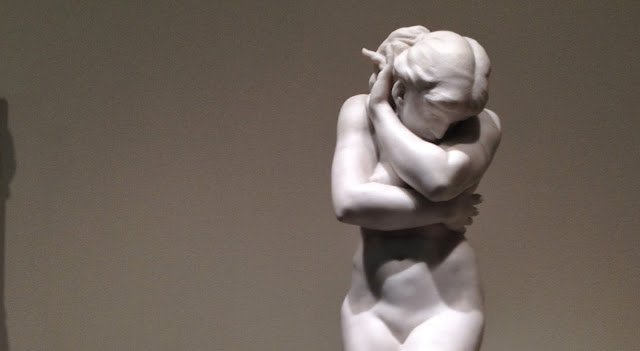The mob was summoned.
It came, and was dispatched to the Capitol.
None of that was secret.
But first they were harangued.
"These people are not going to take it any longer," President Donald Trump said. "They're not going to take it any longer."
The crowd chanted: "Fight for Trump!"
"We will stop the steal," the president said. "Today."
"We are not going to let it happen," the president said. "I am not going to let it happen."
The crowd chanted "We love Trump!"
"You're stronger, you're smarter," the president said. "You're the real people, the people that built this nation."
"Now it's up to Congress to confront this egregious assault on our democracy," the president said. "And after this, we're going to walk down, and I'll be there with you, we're going to walk down. We're going to walk down. Anyone you want, but I think right here.we're going to walk down to the Capitol, and we're going to cheer our brave senators and congressmen and women and we're going to probably not be cheering much for some of them."
Within hours, there was to be much not cheering.
"Because you'll never take our country back with weakness," the president said. "You have to show strength and you have to be strong. We have come to demand that Congress do the right thing and only count the electors who have been lawfully slated, lawfully slated."
"I know that everyone here will soon be marching over to the Capitol building to peacefully and patriotically make your voices heard," said the president.
Don't let that "peacefully" throw you. Donald Trump also talked about the importance of election integrity, the kind of gas-lighting he perfected, the political version of a bully grabbing your hand and ramming it into your face while sneering, "Why are you hitting yourself? Stop hitting yourself!"
Words do have meaning, even in Trump's world, but only certain words, at certain times. The rest is code that must be deciphered or, alas, not. One year has passed, and still understanding is slow in dawning. Democrats lack the vigor and singularity of purpose in saving our democracy that Republicans show in tearing it down. Which is unsurprising, if unforgivable, because it's hard to believe. The whole thing is hard to believe. That's the trick. It's real, and we — patriotic Americans who want to live in a free, small-d democratic country, have to believe it. We must make ourselves believe it. That's the trick. See that it isn't a joke. But real. It happened, is happening. The insurrection of Jan. 6 not only occurred it never stopped, and never will, until somebody stops it.
"The most corrupt election in the history, maybe, of the world," the president said.
"We fight. We fight like hell," the president said. "And if you don't fight like hell, you're not going to have a country anymore."
"And we're going to the Capitol," the president said. "So let's walk down Pennsylvania Avenue."
"We are not going to let it happen," the president said. "I am not going to let it happen."
The crowd chanted "We love Trump!"
"You're stronger, you're smarter," the president said. "You're the real people, the people that built this nation."
"Now it's up to Congress to confront this egregious assault on our democracy," the president said. "And after this, we're going to walk down, and I'll be there with you, we're going to walk down. We're going to walk down. Anyone you want, but I think right here.we're going to walk down to the Capitol, and we're going to cheer our brave senators and congressmen and women and we're going to probably not be cheering much for some of them."
Within hours, there was to be much not cheering.
"Because you'll never take our country back with weakness," the president said. "You have to show strength and you have to be strong. We have come to demand that Congress do the right thing and only count the electors who have been lawfully slated, lawfully slated."
"I know that everyone here will soon be marching over to the Capitol building to peacefully and patriotically make your voices heard," said the president.
Don't let that "peacefully" throw you. Donald Trump also talked about the importance of election integrity, the kind of gas-lighting he perfected, the political version of a bully grabbing your hand and ramming it into your face while sneering, "Why are you hitting yourself? Stop hitting yourself!"
Words do have meaning, even in Trump's world, but only certain words, at certain times. The rest is code that must be deciphered or, alas, not. One year has passed, and still understanding is slow in dawning. Democrats lack the vigor and singularity of purpose in saving our democracy that Republicans show in tearing it down. Which is unsurprising, if unforgivable, because it's hard to believe. The whole thing is hard to believe. That's the trick. It's real, and we — patriotic Americans who want to live in a free, small-d democratic country, have to believe it. We must make ourselves believe it. That's the trick. See that it isn't a joke. But real. It happened, is happening. The insurrection of Jan. 6 not only occurred it never stopped, and never will, until somebody stops it.
"The most corrupt election in the history, maybe, of the world," the president said.
"We fight. We fight like hell," the president said. "And if you don't fight like hell, you're not going to have a country anymore."
"And we're going to the Capitol," the president said. "So let's walk down Pennsylvania Avenue."
And so they did. The mob, that is. The president stayed put and watched. For hours. Delighted.






